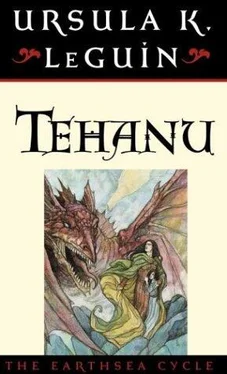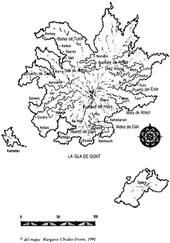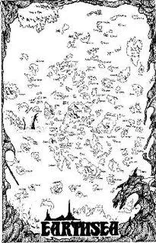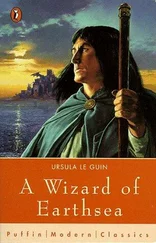Ursula Le Guin - Tehanu The Last Book of Earthsea
Здесь есть возможность читать онлайн «Ursula Le Guin - Tehanu The Last Book of Earthsea» весь текст электронной книги совершенно бесплатно (целиком полную версию без сокращений). В некоторых случаях можно слушать аудио, скачать через торрент в формате fb2 и присутствует краткое содержание. Город: New York, Год выпуска: 1990, Издательство: Atheneum, Жанр: Фэнтези, на английском языке. Описание произведения, (предисловие) а так же отзывы посетителей доступны на портале библиотеки ЛибКат.
- Название:Tehanu The Last Book of Earthsea
- Автор:
- Издательство:Atheneum
- Жанр:
- Год:1990
- Город:New York
- ISBN:нет данных
- Рейтинг книги:4 / 5. Голосов: 1
-
Избранное:Добавить в избранное
- Отзывы:
-
Ваша оценка:
- 80
- 1
- 2
- 3
- 4
- 5
Tehanu The Last Book of Earthsea: краткое содержание, описание и аннотация
Предлагаем к чтению аннотацию, описание, краткое содержание или предисловие (зависит от того, что написал сам автор книги «Tehanu The Last Book of Earthsea»). Если вы не нашли необходимую информацию о книге — напишите в комментариях, мы постараемся отыскать её.
Tehanu The Last Book of Earthsea — читать онлайн бесплатно полную книгу (весь текст) целиком
Ниже представлен текст книги, разбитый по страницам. Система сохранения места последней прочитанной страницы, позволяет с удобством читать онлайн бесплатно книгу «Tehanu The Last Book of Earthsea», без необходимости каждый раз заново искать на чём Вы остановились. Поставьте закладку, и сможете в любой момент перейти на страницу, на которой закончили чтение.
Интервал:
Закладка:
“Is that it, then,” she asked, kneeling, watching him- “the joy, the coming into light?”
He did not answer.
A king in Havnor, she thought, and said aloud, “A king in Havnor! ‘ ‘
The vision of the beautiful city was in her, the wide streets, the towers of marble, the tiled and bronze roofs, the white-sailed ships in harbor, the marvelous throne room where sunlight fell like swords, the wealth and dignity and harmony, the order that was kept there. From that bright center, she saw order going outward like the perfect rings on water, like the straightness of a paved street or a ship sailing before the wind: a going the way it should go, a bringing to peace.
“You did well, dear friend,” she said.
He made a little gesture as if to stop her words, and then turned away, pressing his hand to his mouth. She could not bear to see his tears. She bent to her work. She pulled a weed, and another, and the tough root broke. She dug with
her hands, trying to find the root of the weed in the harsh soil, in the dark of the earth.
“Goha,” said Therru’s weak, cracked voice at the gate, and Tenar looked round. The child’s half-face looked straight at her from the seeing eye and the blinded eye. Tenar thought, Shall I tell her that there is a king in Havnor?
She got up and went to the gate to spare Therru from trying to make herself heard. When she lay in the fire unconscious, Beech said, the child had breathed in fire. “Her voice is burned away,” he explained.
“I was watching Sippy,” Therru whispered, “but she got out of the broom-pasture. I can’t find her. ‘ ‘
It was as long a speech as she had ever made. She was trembling from running and from trying not to cry. We can’t all be weeping at once, Tenar said to herself-this is stupid, we can’t have this!- “Sparrowhawk! ‘ ‘ she said, turning, “there’s a goat got out.
He stood up at once and came to the gate.
“Try the springhouse,” he said.
He looked at Therru as if he did not see her hideous scars, as if he scarcely saw her at all: a child who had lost a goat, who needed to find a goat. It was the goat he saw. “Or she’s off to join the village flock,” he said.
Therru was already running to the springhouse.
“Is she your daughter?” he asked Tenar. He had never before said a word about the child, and all Tenar could think for a moment was how very strange men were.
“No, nor my granddaughter. But my child,’ ‘ she said. What was it that made her jeer at him, jibe at him, again?
He let himself out the gate, just as Sippy dashed toward them, a brown-and-white flash, followed far behind by Therru.
“Hi!” Ged shouted suddenly, and with a leap he blocked the goat’s way, heading her directly to the open gate and Tenar’s arms. She managed to grab Sippy’s loose leather collar. The goat at once stood still, mild as any lamb, looking at Tenar with one yellow eye and at the onion-rows with the other.
“Out,” said Tenar, leading her out of goat heaven and over to the stonier pasture where she was supposed to be.
Ged had sat down on the ground, as out of breath as Therru, or more so, for he gasped, and was evidently dizzy; but at least he was not in tears. Trust a goat to spoil any-. thing.
“Heather shouldn’t have told you to watch Sippy,” Tenar said to Therru. “Nobody can watch Sippy. If she gets out again, tell Heather, and don’t worry. All right?’ ‘
Therru nodded. She was looking at Ged. She seldom looked at people, and very seldom at men, for longer than a glance; but she was gazing at him steadily, her head cocked like a sparrow. Was a hero being born?
Worsening
It was well over a month since the solstice, but the evenings were still long up on the west-facing Overfell. Therru had come in late from an all-day herbal expedition with Aunty Moss, too tired to eat. Tenar put her to bed and sat with her, singing to her. When the child was overtired she could not sleep, but would crouch in the bed like a paralyzed animal, staring at hallucinations till she was in a nightmare state, neither sleeping nor waking, and unreachable. Tenar had found she could prevent this by holding her and singing her to sleep. When she ran out of the songs she had learned as a farmer’s wife in Middle Valley, she sang interminable Kargish chants she had learned as a child priestess at the Tombs of Atuan, lulling Therru with the drone and sweet whine of offerings to the Nameless Powers and the Empty Throne that was now filled with the dust and ruin of earthquake. She felt no power in those songs but that of song itself; and she liked to sing in her own language, though she did not know the songs a mother would sing to a child in Atuan, the songs her mother had sung to her.
Therru was fast asleep at last. Tenar slipped her from her lap to the bed and waited a moment to be sure she slept on. Then, after a glance round to be sure she was alone, with an almost guilty quickness, yet with the ceremony of enjoyment, of great pleasure, she laid her narrow, light-skinned hand along the side of the child’s face where eye and cheek had been eaten away by fire, leaving slabbed, bald scar. Under her touch all that was gone. The flesh was whole, a child’s round, soft, sleeping face. It was as if her touch restored the truth.
Lightly, reluctantly, she lifted her palm, and saw the irremediable loss, the healing that would never be whole.
She bent down and kissed the scar, got up quietly, and went out of the house.
The sun was setting in a vast, pearly haze. No one was about. Sparrowhawk was probably off in the forest. He had begun to visit Ogion’s grave, spending hours in that quiet place under the beech tree, and as he got more strength he took to wandering on up the forest paths that Ogion had loved. Food evidently had no savor to him; Tenar had to ask him to eat. Companionship he shunned, seeking only to be alone. Therru would have followed him anywhere, and being as silent as he was she did not trouble him, but he was restless, and presently would send the child home and go on by himself, farther, to what ends Tenar did not know. He would come in late, cast himself down to sleep, and often be gone again before she and the child woke. She would leave him bread and meat to take with him.
She saw him now coming along the meadow path that had been so long and hard when she had helped Ogion walk it for the last time. He came through the luminous air, the wind-bowed grasses, walking steadily, locked in his obstinate misery, hard as stone.
“Will you be about the house?” she asked him, across some distance. “Therru’s asleep. I want to walk a little.”
“Yes. Go on,” he said, and she went on, pondering the indifference of a man towards the exigencies that ruled a woman: that someone must be not far from a sleeping child, that one’s freedom meant another’s unfreedom, unless some ever-changing, moving balance were reached, like the balance of a body moving forward, as she did now, on two legs, first one then the other, in the practice of that remarkable art, walking. . . . Then the deepening colors of the sky and the soft insistence of the wind replaced her thoughts. She went on walking, without metaphors, until she came to the sandstone cliffs. There she stopped and watched the sun be lost in the serene, rosy haze.
She knelt and found with her eyes and then with her fingertips a long, shallow, blurred groove in the rock, scored right out to the edge of the cliff: the track of Kalessin’s tail. She followed it again and again with her fingers, gazing out into the gulfs of twilight, dreaming. She spoke once. The name was not fire in her mouth this time, but hissed and dragged softly out of her lips, “Kalessin. . . .“
She looked up to the east. The summits of Gont Mountain above the forests were red, catching the light that was gone here below. The color dimmed as she watched. She looked away and when she looked back the summit was grey, obscure, the forested slopes dark.
Читать дальшеИнтервал:
Закладка:
Похожие книги на «Tehanu The Last Book of Earthsea»
Представляем Вашему вниманию похожие книги на «Tehanu The Last Book of Earthsea» списком для выбора. Мы отобрали схожую по названию и смыслу литературу в надежде предоставить читателям больше вариантов отыскать новые, интересные, ещё непрочитанные произведения.
Обсуждение, отзывы о книге «Tehanu The Last Book of Earthsea» и просто собственные мнения читателей. Оставьте ваши комментарии, напишите, что Вы думаете о произведении, его смысле или главных героях. Укажите что конкретно понравилось, а что нет, и почему Вы так считаете.








